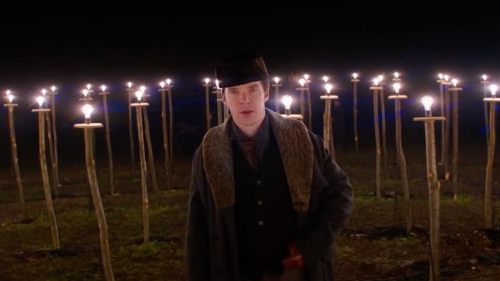WACO Review: Episode Two (“The Strangers Across The Street”)
There are power structures inside every institution we either build or exist within. The Branch Davidian cult led by David Koresh (Taylor Kitsch) was no different. While Koresh was obviously its leader - holding chapel services where he branded himself one of God's guiding "lambs" - he had an inner circle to whom he listened, which included his wives - Rachel (Melissa Benoist) and Judy (Andrea Riseborough) - and closest colleagues. When an unknown gaggle of men move into the farmhouse across the road from the Mount Carmel compound - ATF Agents dispatched to relay intel back to home base - Koresh finds himself faced with a choice. Should he invite them in, or reject these potential Armies of Babylon completely? Most of his closest advisors vote to turn the cops away, as letting them through the door meant essentially giving them a search warrant. Yet Judy doesn't understand how that action would jibe with their belief structure. They're here to provide comfort and share God's love. Closing the door on strangers is the opposite of that.
Speaking up at these meetings causes a rift between Koresh's two partners/counselors, as Rachel warns Judy that - since she's now carrying his child - David is going to listen to her more and give her words weight. The rest of the group is warning Koresh about the difference between how the Branch will be judged through man's laws versus God's laws - an intellectual argument based in hard facts (as their new neighbors' plates are traced back to the government). Meanwhile, Judy’s voice is now mixed with the cadence of their unborn child, causing David to make an emotional decision rather more than a rational one. Then there's the question of Michelle (Julia Garner), a third partner with whom David fathered a child while she was still a minor, placing him in danger of being arrested for inappropriate sexual contact.
It's a Catch-22 scenario: should the Branch argue polygamy - because if David fathered the child in wedlock, the act wouldn't be a crime - the marriage is still illegal. But without that defense, David's guilty of statutory rape. Meanwhile, Michelle argues that she was never given a choice in the matter, regardless of legality. For it was Rachel's dream that led to Michelle and David's union, and the conception of their daughter, Serenity (Vivien Lyra Blair). There were no declarations of love; none that organically developed over the course of a relationship, anyway. So, what choice did she even have in the matter? It's a complex question, posed by a woman who gave herself over to a faith without technically possessing the capacity to do so under man’s law. But all that matters in Mount Carmel is protecting the church, so she's forced into another marriage to cover up David's crimes. To Thibodeau (Rory Culkin) she is wed, and Serenity will now be passed off as their child, should an investigation commence, mechanisms put in motion to keep the lamb safe.
Special Agent Gary Noesner (Michael Shannon) is feeling the strain a cog in his machine would, should the internal workings and goals change while he continues grinding in a different direction. For Noesner, the only acceptable way to end any negotiation in a hostage situation is peacefully, with a suspect in cuffs and no one - guilty, innocent or official - leaving the scene harmed. Yet after Ruby Ridge - where women and children lost their lives due to a bunk sniper order - he sees the FBI becoming a militarized operation, funneling $10 million dollars into a department (the Hostage Rescue Team [HRT]) that would take these types of situations by force. The head of this department? The man who gave the command for the hidden gunman to open fire on that Idaho cabin: Richard Rogers (Shea Whigham). Only, should Noesner raise a formal complaint, he would be winning "no popularity contests" (as a member of the IA squad tells him); he’d be a pariah, forever branded with a scarlet letter for speaking up when he thought something wasn't right in the Bureau he loves.
By the end of its second episode, Waco’s reveals itself to be a Limited Series about the nature of faith - not just in God, but in any institution we choose to become a part of - and those beliefs are constantly questioned as we (and our houses) change over time. David is almost myopic in his belief that God's Will can allow any man - even if they're sent to end his own church - to see the light of His path. David’s wives are all struggling with their roles beneath his reign, unsure when to speak, or how to show their absolute devotion to both their messiah and the Branch, while keeping their own individual souls intact. Agent Noesner is unsure of his place inside an FBI that may no longer value the same things he did when he first signed up. It all becomes a confluence of interrogations, disguised as simple pulpy historical recreation.
ATF Agent Robert Rodriguez (John Leguizamo) may be having the biggest conflict of conscience of all. Being the agency's eyes on the ground, he's looking for any reason the ATF needs to kick the door in and break the Branch up, shipping David off for multiple crimes, while the children they believe are being abused are placed in protective custody. But the closer Agent Rodriguez gets to these believers, the less he believes David or anyone in the Branch to be a threat to the outside world. A "whipping” given to a child for stealing ice cream from the kitchen is transformed into an incredibly gentle teaching lesson for the rest of the Davidians. Though Thibodeau and Michelle's marriage may be a sham, the ceremony is still a joyous one, where Koresh invites Robert to let go of his shyness and cut loose a little. These people want him to know that everything he sees is about love, and that he should relax whenever he's around them. The political gain - manufacturing good press to wash off the bloodstains Ruby Ridge left on the ATF - can't be worth destroying these people’s way of life, can it?
There's an old school TV Movie of the Week feel to Waco that helps create a sense of dissonance with the Event Series' anti-government themes. There's very little profanity, no graphic sex or violence, and the constant talk about God almost gives it a faith-based slant. But beneath it all is a message about questioning the very nature of the people, places and things that we put our faith in the most. It's only two episodes in, but Drew and John Erick Dowdle have delivered on a current entertainment craze - '90s history reconfigured as prime time drama - in a new way: making an almost family-friendly thriller that begs you to second guess any and all powers that be.



